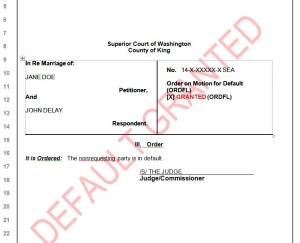 An Order of Default Will Quickly End Your Divorce Case If You Do Not File Your Response.
An Order of Default Will Quickly End Your Divorce Case If You Do Not File Your Response.
The Case of the Procrastinating Client.
A client came in with a large stack of divorce papers 4-5 months old. “This is all I have” he said, assuring me little had happened in his case. “We were not getting along before, but we’ve been very amicable and this should settle quickly after I give her my information.”
After checking the court record, I gave him the unfortunate news. His ex had obtained a default and final orders, and the case was over.
The 20 Day Rule in a Seattle Divorce Case.
Once a divorce case is filed and the petition for dissolution and accompanying documents are provided (“served”), the fastest way to lose is to ignore the documents, miss the 20 day deadline (60 days if out-of-state) to file a response to the petition, and allow a proactive opposing attorney to file for default.
Review the Summons.
“You must respond to this summons and petition by serving a copy of your written response …… If you do not serve your written response within 20 days (or 60 days if you are served outside of Washington) after the date this summons was served on you….. the court may enter an order of default against you, and the court may…. enter a decree and approve or provide for the relief requested in the petition.” (emphasis added)
File and Serve Your Response Promptly.
Divorce documents should be reviewed as soon as possible following service to avoid a default – preferably with an attorney who can explain them – and addressed in a timely filed response. Failing to file a response to the petition is a major gaffe that can be easily avoided. A response requires only that you admit, deny (with explanation), or lack knowledge to address the allegations asserted in the petition. If you are not sure whether to deny a statement, you can response you “lack knowledge” and amend the response later on. The Washington State mandatory form response to a petition for dissolution is available here. Response to Petition
Missing the Response Deadline Puts You at Serious Risk of Default.
The motion for default judgment can be filed any time after the response deadline is missed. It is a relatively simple procedure. In King County, the party must give 14 days’ notice of the motion for default, and the commissioner at the hearing will typically review the filed documents to assure compliance with the law. Once approved and entered, the effect is the other spouse is granted everything asked for –property, child support (with their income figures), spousal maintenance, and a proposed parenting plan if applicable.
Your Spouse Obtained Default Judgment– Now What?
If you act quickly after being notified of the default, you may be able to set aside the default order by filing a Motion to Vacate under Washington State Court Rule 60 (“CR 60”). See Washington State Court Rule 60.
Default orders are generally disfavored by Washington courts. The court prefers both parties to have their day in court. Nevertheless, setting a default aside requires substantial evidence to support one of the reasons enumerated in CR 60 to overturn a default. It is a difficult legal burden to meet and a costly legal procedure that can and should be avoided.
